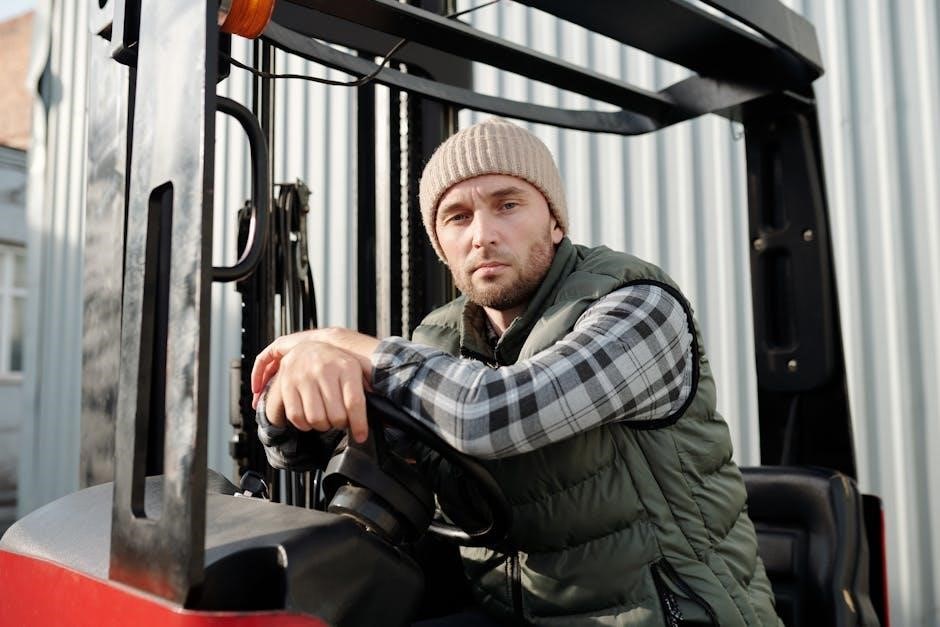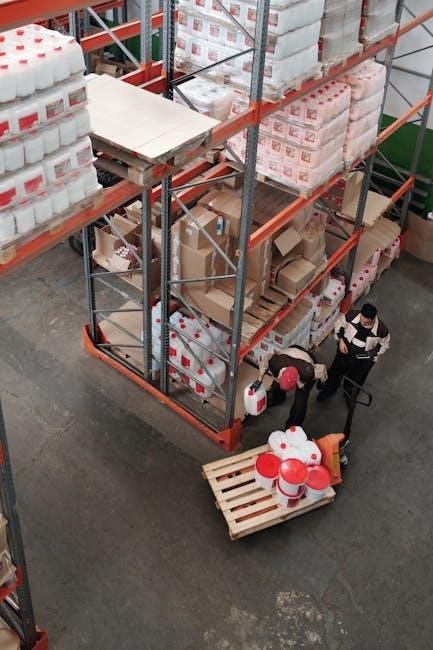Manual forklift rentals offer a cost-effective solution for businesses needing efficient material handling without long-term commitments. Versatile and ergonomic, they suit various industries, ensuring safety and productivity. Renting provides flexibility and access to top-tier equipment, tailored to specific operational needs, with options available from leading providers.
Overview of Manual Forklifts
Manual forklifts are versatile, non-powered equipment designed for lifting and moving materials in various settings. They include hand pallet trucks, manual stackers, and hydraulic hand trucks, offering efficient solutions for light to medium-duty tasks. These units are ideal for small warehouses, retail spaces, and construction sites, providing cost-effective alternatives to powered forklifts. Their compact design and ease of operation make them suitable for tight spaces, ensuring safe and efficient material handling without the need for complex mechanical systems.
Benefits of Renting Manual Forklifts
Renting manual forklifts provides cost-effective solutions for temporary or fluctuating material handling needs. It eliminates the financial burden of ownership, reducing upfront costs and long-term maintenance responsibilities. Businesses can access high-quality, well-maintained equipment tailored to specific tasks without capital investment. Rental options offer flexibility, with short-term or long-term agreements available, ensuring scalability to meet changing operational demands. This approach supports efficiency, safety, and productivity while maintaining budgetary control.
Types of Manual Forklifts Available for Rent
Manual forklifts for rent include hand pallet trucks, manual stackers, hydraulic hand trucks, and manual chain hoists. These models offer diverse solutions for efficiently moving, lifting, and transporting loads.
Hand Pallet Trucks
Hand pallet trucks are the most common type of manual forklift, ideal for small to medium load handling. They are cost-effective, with rentals starting at $47 daily. Lightweight and portable, these trucks are perfect for tight spaces, offering easy maneuverability and minimal maintenance. Durable designs ensure long-lasting performance, making them a practical choice for short-term rental needs across various industries.
Manual Stackers
Manual stackers are versatile tools designed for lifting and stacking loads in various settings. They are ideal for small warehouses, offering a cost-effective solution for short-term needs. With a focus on safety, these stackers often feature ergonomic designs to reduce operator fatigue. Rental options are widely available, providing businesses with flexibility and access to reliable equipment without significant upfront costs. Their simplicity and durability make them a popular choice for industries requiring efficient material handling solutions.
Hydraulic Hand Trucks
Hydraulic hand trucks are efficient tools for lifting and moving heavy loads, combining manual operation with hydraulic assistance for easier handling. These trucks are ideal for warehouses, construction sites, and logistics operations, offering a cost-effective solution for short-term needs. Their ergonomic design reduces operator strain, while their compact size allows for easy maneuverability in tight spaces. Rentals provide businesses with access to reliable equipment without long-term investment, making them a practical choice for enhancing productivity and safety in material handling tasks.
Manual Chain Hoists
Manual chain hoists are versatile and portable lifting solutions, ideal for various material handling tasks. They offer a reliable way to lift heavy loads safely and efficiently, with minimal effort required. Suitable for both indoor and outdoor applications, these hoists are often used in construction, manufacturing, and logistics. Renting manual chain hoists provides a cost-effective alternative for short-term projects, ensuring access to durable equipment without the need for long-term investment in ownership.
Safety Considerations for Manual Forklift Rentals
Ensure proper operation, load management, and regular equipment checks. Adhere to safety standards and manufacturer guidelines to minimize risks and ensure a secure working environment.
Training Requirements for Operators
Operators must undergo comprehensive training to ensure safe and efficient use of manual forklifts. Training covers equipment features, load handling, and safety protocols, complying with industry standards. Proper instruction reduces accidents and liability, while ensuring adherence to rental agreements. Many providers offer training resources or require certification before rental. Operators should understand operational limits and emergency procedures. Regular refreshers are recommended to maintain proficiency and adapt to updated safety guidelines. Proper training is essential for maximizing safety and productivity.
Pre-Rental Inspection Checklist
A thorough pre-rental inspection ensures the manual forklift is in optimal condition. Check the condition of tires, brakes, and hydraulic systems for proper functionality. Verify load capacity and lift height alignment with your needs. Inspect for any damage or wear on forks, chains, and frames. Ensure lubrication of moving parts and proper operation of controls. Test the horn and lights for functionality. Review maintenance records and ensure safety accessories like mirrors and warning devices are intact; Conduct a test lift to confirm smooth operation before use.
Safe Operating Practices
Always ensure the area is clear of personnel before operating. Properly stop and park the forklift on level ground, engaging the brake. Never load beyond the recommended capacity and maintain a stable center of gravity. Use safety gear and ensure visibility. Avoid sudden movements and keep hands and feet inside the truck. Regularly check surroundings and follow traffic rules in the workspace. Proper training and adherence to safety protocols are essential to prevent accidents and ensure efficient operation.
Cost of Renting a Manual Forklift
Manual forklift rentals are cost-effective, with options starting at $47 daily, $130 weekly, or $260 monthly. Discounts are often available for online bookings, offering flexibility for businesses.
Factors Affecting Rental Costs
Rental costs for manual forklifts vary based on equipment type, capacity, lift height, and rental duration. Location, supplier, and seasonal demand also influence pricing. Additionally, maintenance and repair services included in the rental agreement can impact the overall cost. Understanding these factors helps businesses make informed decisions to optimize their budget for material handling needs.
Comparing Costs: Manual vs. Electric Forklifts
Manual forklifts are generally more cost-effective to rent than electric models, with daily rates starting at around $47 compared to electric options, which can be significantly higher. Rental costs for manual forklifts are influenced by their lower maintenance needs and simpler design. Electric forklifts, while more efficient for heavy-duty tasks, incur higher rental fees due to advanced features and higher energy requirements. The choice depends on workload demands and rental duration, making manual models ideal for lighter, short-term applications.
Short-Term vs. Long-Term Rental Pricing
Short-term manual forklift rentals typically incur higher daily rates, ideal for temporary needs, while long-term rentals offer discounted rates for extended periods. For example, daily rates might start at $47, weekly at $130, and monthly at $260. Long-term agreements often include bulk pricing or loyalty discounts, reducing overall costs. Providers may tailor pricing based on rental duration, with incentives for commitments exceeding a few months. This flexibility helps businesses optimize budgets according to project timelines and operational demands.

Manual Forklift Rental vs. Purchase
Manual forklift rental offers a cost-effective alternative to purchasing, with lower upfront costs and included maintenance, providing flexibility for businesses with fluctuating material handling needs.
Pros and Cons of Renting vs. Buying
Renting manual forklifts offers lower upfront costs, flexibility, and included maintenance, ideal for short-term needs. However, it involves recurring payments and no equipment ownership. Buying provides long-term savings and customization but requires significant initial investment and maintenance responsibilities. Renting is cost-effective for fluctuating demands, while purchasing suits stable, high-volume operations. The choice depends on business needs, budget, and operational longevity.
When to Choose Rental Over Purchase
Rental is ideal for short-term projects, seasonal demands, or testing equipment before purchasing. It avoids high upfront costs and provides flexibility, allowing businesses to adapt to changing needs. Maintenance and repairs are often included, reducing liability. Renting is cost-effective for small-scale operations or when budget constraints exist. It’s also suitable for evaluating equipment suitability before committing to ownership, ensuring resources are allocated efficiently without long-term financial burdens.
Financial Implications of Each Option
Renting a manual forklift eliminates upfront costs, offering a budget-friendly solution for short-term needs. It allows businesses to allocate funds flexibly without long-term financial commitments. In contrast, purchasing requires a significant initial investment but may prove cost-effective over time for frequent use. Rental agreements often include maintenance, reducing additional expenses. Understanding usage frequency and budget constraints helps determine whether renting or buying is more financially beneficial for specific operational requirements.

The Rental Process Explained
Renting a manual forklift involves selecting equipment, choosing rental duration, reviewing agreements, and arranging delivery; Providers offer streamlined processes, ensuring quick access to necessary tools for seamless operations.
Steps to Rent a Manual Forklift
To rent a manual forklift, start by selecting the right equipment based on load capacity and lift height. Contact the rental provider to discuss your needs and confirm availability. Review and agree on rental terms, including duration and pricing. Ensure the rental agreement outlines responsibilities for maintenance and damage. Finally, arrange for delivery or pickup, ensuring the forklift is inspected before use to guarantee safety and productivity.
What to Expect in a Rental Agreement
A rental agreement for a manual forklift typically outlines the rental duration, equipment specifications, and terms. It includes payment terms, delivery details, and responsibilities for maintenance. The agreement also specifies acceptable use, liability, and insurance coverage. Expect clauses regarding equipment inspection, return conditions, and potential penalties for damage or late returns. Ensure all terms are clear to avoid disputes and ensure a smooth rental experience.
Delivery and Pickup Options
Manual forklift rentals often include convenient delivery and pickup services, ensuring equipment arrives at your site ready to use. Many providers offer flexible scheduling, including express delivery and weekend availability; Delivery costs may be included in the rental fee or billed separately. Pickup options are typically arranged at the end of the rental period, with some companies offering extended hours for added convenience. This service minimizes downtime, allowing businesses to focus on their operations efficiently.
Applications and Industries Served
Manual forklifts are ideal for warehousing, distribution centers, retail, and logistics, enabling efficient material handling and inventory movement in diverse industrial settings.
Warehousing and Distribution Centers
Manual forklifts are essential in warehousing and distribution centers for efficiently moving pallets, managing inventory, and streamlining operations. Their versatility and cost-effectiveness make them ideal for handling heavy loads in tight spaces. Rental options provide businesses with the flexibility to scale operations without significant investment, ensuring smooth workflow and enhanced productivity. Leading providers like EquipmentShare and Sunbelt Rentals offer reliable models tailored to meet specific demands, ensuring safety and efficiency in fast-paced environments.
Retail and Logistics Operations
Manual forklifts play a vital role in retail and logistics operations, enabling efficient inventory management and streamlined workflows. They are ideal for handling pallets, boxes, and other goods in busy environments. Rental options provide flexibility, allowing businesses to adapt to fluctuating demands without long-term commitments. With models like manual pallet jacks and hydraulic hand trucks, companies can enhance productivity while maintaining cost-efficiency. Leading providers offer tailored solutions, ensuring operations remain seamless and scalable.
Construction and Manufacturing Sectors
Manual forklifts are essential in construction and manufacturing for moving heavy materials and equipment efficiently. They are ideal for rugged environments, offering durability and reliability. Rental options allow businesses to access specialized models, such as hydraulic hand trucks and manual stackers, without significant upfront costs. This flexibility supports project-specific needs, ensuring smooth operations and adherence to deadlines. Renting also enables companies to scale their fleet according to workload, optimizing resource allocation and overall productivity.
Top Brands Offering Manual Forklift Rentals
Top brands like Sunbelt Rentals, EquipmentShare, Komatsu, Crown, and EP Equipment offer reliable manual forklift rentals. Their fleets include diverse models like the EP Equipment EFL252, ensuring versatility and efficiency for various industrial needs.
Well-Known Brands in the Industry
Leading companies like Sunbelt Rentals, EquipmentShare, and Komatsu specialize in manual forklift rentals, offering high-quality equipment tailored to diverse industrial needs. These brands provide reliable solutions, ensuring efficiency and safety. Sunbelt Rentals offers a wide range of manual material handling equipment, while EquipmentShare emphasizes state-of-the-art technology and customer support. Komatsu, with decades of experience, delivers durable and versatile forklifts, meeting both short-term and long-term rental demands across various sectors.
Specialized Features of Each Brand
Sunbelt Rentals offers compact electric forklifts and telehandlers, ideal for tight spaces and heavy-duty tasks. EquipmentShare provides ergonomic manual material handling solutions with advanced safety features and real-time tracking. Komatsu emphasizes durability and versatility, catering to both short-term and long-term needs with a wide range of capacities. These brands ensure superior performance, reliability, and innovation, making them top choices for manual forklift rentals across various industries and applications.
Maintenance and Repair During Rental
Rental providers often include maintenance and repair services in their packages, ensuring equipment reliability. Linde offers fixed monthly rates for maintenance, while Komatsu dealers provide comprehensive support, guaranteeing operational readiness throughout the rental period.
Responsibilities of the Rental Provider
Rental providers are responsible for ensuring equipment is in optimal condition. This includes regular maintenance, repairs, and inspections to prevent downtime. Many offer comprehensive support packages, such as Linde’s fixed-rate maintenance program, ensuring equipment readiness. Providers often handle on-site repairs and provide emergency assistance. They may also offer training for operators to ensure safe and efficient use. By managing maintenance, rental providers enable lessees to focus on operations while maintaining equipment performance and safety standards throughout the rental period.
Roles of the Lessee in Maintenance
Roles of the Lessee in Maintenance
The lessee plays a crucial role in maintaining rented manual forklifts. Daily inspections are essential to identify and report any damage or malfunctions. Proper operation and adherence to safety guidelines prevent wear and tear. Lessees must follow manufacturer instructions and ensure operators are trained. Regular cleaning and timely reporting of issues help maintain equipment performance. By fulfilling these responsibilities, lessees contribute to the longevity and efficiency of the forklift, ensuring safe and productive use throughout the rental period.
Emergency Procedures and Support
In case of emergencies, lessees should immediately stop operation and contact the rental provider for assistance. Providers typically offer 24/7 support for urgent issues. Regular maintenance and inspections can prevent breakdowns, but having a clear emergency plan ensures quick resolution. Many companies provide on-site repair services and access to spare parts, minimizing downtime. Prompt reporting of incidents ensures safety and efficiency, with support teams ready to address mechanical failures or operational hazards swiftly and effectively.

Insurance and Liability Coverage
Insurance coverage is often included in rental agreements, protecting against equipment damage or theft; Liability coverage shields businesses from accident-related claims, ensuring financial protection during rental periods.
Types of Insurance for Rentals
Rental agreements often include insurance to cover equipment damage or theft. Liability insurance protects against third-party claims from accidents. Some providers offer additional coverage for operator errors or unforeseen incidents. Policies may vary, so reviewing terms before rental is essential to ensure adequate protection. This ensures both the lessee and rental company are safeguarded during the rental period, minimizing financial risks associated with equipment use.
Liability Coverage and Protection
Liability coverage protects both the renter and provider in case of accidents or property damage. It typically covers third-party claims resulting from equipment use. Policies often include protection against accidental damage to the rented forklift or injuries to operators or bystanders. Coverage limits and deductibles vary, ensuring financial security for all parties involved during the rental period.
How to Choose the Right Insurance
When selecting insurance for manual forklift rentals, assess your coverage needs based on equipment value, operational risks, and potential liabilities. Evaluate policy limits, deductibles, and exclusions to ensure adequate protection. Verify if the policy covers accidental damage, theft, and third-party claims. Compare providers to find comprehensive coverage at competitive rates. Ensure the insurance aligns with local regulations and rental terms. Consulting with insurance experts can help tailor the policy to your specific rental situation.
Customer Support and Service
Reputable rental providers offer 24/7 customer support, ensuring timely assistance for maintenance, repairs, and operational queries. Their dedicated teams prioritize customer satisfaction, providing efficient solutions.
Availability of Customer Support
Leading rental providers offer 24/7 customer support, ensuring prompt assistance for maintenance, repairs, and operational inquiries. Dedicated support teams are committed to resolving issues quickly, minimizing downtime. Many companies provide around-the-clock service, with rapid response times to address emergencies. This availability ensures seamless operations and peace of mind for renters, keeping their workflows efficient and uninterrupted. Support is often tailored to specific customer needs, guaranteeing a smooth rental experience.
Technical Assistance and Service
Rental providers offer comprehensive technical assistance, ensuring equipment operates smoothly. Expert teams provide on-site repairs, maintenance, and troubleshooting. Regular servicing is often included, covering lubrication, hydraulic checks, and part replacements. This dedicated support minimizes downtime and extends equipment lifespan. Many companies also provide operator training to enhance safety and efficiency. With round-the-clock technical service, renters can address issues promptly, ensuring uninterrupted workflow and optimal performance of their manual forklifts throughout the rental period.
Customer Feedback and Testimonials
Customers praise manual forklift rentals for their efficiency and durability. Many highlight the cost-effectiveness and ease of use, stating they meet specific operational needs. Testimonials often mention excellent rental service quality, with providers delivering reliable equipment and prompt support. Businesses appreciate the flexibility and tailored solutions offered, ensuring seamless integration into their workflows. Positive feedback underscores the value of manual forklifts in enhancing productivity while maintaining affordability, making them a preferred choice for various industries.

Environmental Considerations
Manual forklift rentals often include eco-friendly options, reducing carbon footprints. Energy-efficient designs minimize environmental impact, aligning with sustainable practices and supporting green initiatives across industries.
Eco-Friendly Manual Forklift Options
Manual forklift rentals increasingly feature eco-friendly designs, such as energy-efficient models with reduced emissions. Many rental providers now offer sustainable options, including electric and manual equipment with lower environmental impact. These eco-conscious solutions support businesses in reducing their carbon footprint while maintaining operational efficiency. Rental fleets often include greener alternatives, making it easier for companies to adopt environmentally responsible practices without sacrificing performance or versatility in material handling tasks.
Energy Efficiency in Rentals
Energy efficiency is a key focus in manual forklift rentals, with many models designed to minimize power consumption. Electric pallet jacks and manual lifts often feature low-energy motors, reducing operational costs. Rental providers prioritize equipment with energy-saving technologies, such as regenerative braking and LED lights. These advancements ensure that businesses can maintain productivity while lowering their environmental impact and energy expenses, making rentals a sustainable and cost-effective choice for material handling needs.
Sustainable Practices in Rentals
Rental companies increasingly adopt sustainable practices, offering eco-friendly manual forklifts that reduce environmental impact. Many providers prioritize energy-efficient equipment and recyclable materials, lowering carbon footprints. Regular maintenance ensures longer equipment life, minimizing waste. Some firms offer rental options for refurbished models, promoting sustainability. These practices help businesses meet environmental goals while maintaining operational efficiency, making manual forklift rentals a responsible choice for modern industries focused on reducing their ecological footprint.
Manual forklift rentals provide a practical solution for businesses, combining cost efficiency, safety, and operational flexibility. Leading providers ensure access to reliable, high-quality equipment tailored to meet specific needs.
Final Thoughts on Manual Forklift Rentals
Manual forklift rentals are a practical choice for businesses seeking cost-effective, efficient, and safe material handling solutions. With options like pallet jacks and manual stackers, they cater to diverse needs. Leading providers offer well-maintained equipment, ensuring reliability and productivity. Rental agreements often include maintenance support, reducing downtime. Whether for short-term projects or long-term use, manual forklifts provide flexibility and value; Businesses can trust reputable brands like Sunbelt Rentals and EquipmentShare for tailored solutions, enhancing operational efficiency without significant upfront costs. Renting manual forklifts is a smart decision for optimizing workflow and budget.
Encouragement to Make an Informed Decision
When considering manual forklift rentals, it’s crucial to evaluate your specific needs and budget. Compare rental options, costs, and terms to ensure the best fit for your operations. Research providers, read reviews, and ask about maintenance support. Understanding the total cost of rental, including insurance and delivery fees, will help you make a well-informed decision. By choosing the right equipment and provider, you can optimize efficiency, safety, and cost-effectiveness for your business. Take the time to weigh your options carefully.



